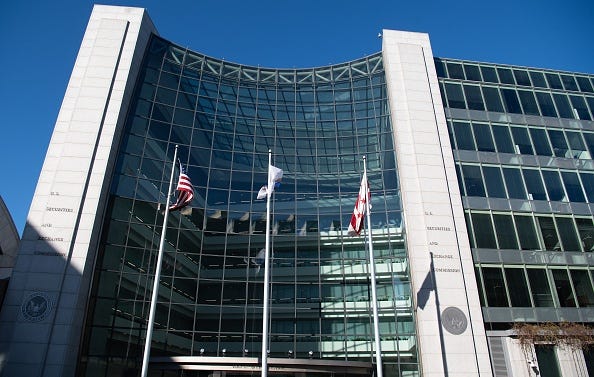Talking Hedge Funds and SEC Rules; Crypto Enforcement Case Takes Surprising Turn; Frustration With Shareholder Proposal Process Rises
Capitol Account: Free Weekly Edition
Financial regulation news was all over the map this week. OCC chief Michael Hsu gave a major speech on bank merger policy — and nobody seemed to like his ideas. House Republican lawmakers continued their assault on the Basel capital rules at a hearing, which (finally) featured a spirited defense of the effort. On the legal front, the SEC sought to drop a crypto enforcement case after its trial team was called out by the judge for making false statements. We also looked at the securities regulator’s byzantine, and increasingly controversial, shareholder proposal process in light of a recent lawsuit filed by Exxon Mobil. For our Friday interview, we spoke to a leading regulatory lawyer at MFA. The hedge fund trade association is squaring off against the SEC next week in a federal appeals court.
Thanks for subscribing to our free digest of articles we published throughout the week. The daily newsletter had many more. If you like what you read, click the button below to upgrade.
Friday Q and A: Chair Gary Gensler’s extensive rulemaking agenda takes aim at a broad swath of the financial industry. But hedge funds have been a particular target – and a vigorous opponent. Some of the industry’s tough tactics will be on display early next week in the U.S. Court of Appeals for the Fifth Circuit, where judges will hear arguments in a lawsuit seeking to overturn an SEC rule that would bolster oversight of private funds.
Looking to get some insight into the landmark case, we sat down this week with Jennifer Han, chief counsel and head of global regulatory affairs at MFA. The trade group is helping lead the litigation and she’s planning to be in the courthouse.
Not surprisingly, the SEC takes up a lot of time on Han’s calendar, but as the point person for all of MFA’s regulatory advocacy she is also in close contact with policy makers at the Fed, Treasury, CFTC and on Capitol Hill. And that’s just in the U.S. Before joining MFA in 2006, Han worked at the SEC as a staff attorney in what was then known as the Office of Compliance Inspections and Examinations. Read on to learn her thoughts about suing regulators, writing comment letters and the dangers of scheduling vacations in this era of frenzied rulemaking. What follows is our (lightly edited and condensed) conversation.
Capitol Account: What’s it like being the top regulatory lawyer for a hedge fund trade association?
Jennifer Han: There's a lot of misunderstanding of the industry. A lot of regulations are poorly drafted to target very superficial concerns – which are oftentimes not grounded on fact. One of my core functions is to make sure that we get proper, appropriate rules in place that do not harm the industry…The last two years have been busier than ever.
CA: MFA files a lot of comment letters. What’s the goal?
JH: A key objective is to work with regulators to ensure that we land in a place that is workable. Generally, the regulators have some concern, which is spurring their regulation. It is incumbent on us to educate and explain. While we may not always agree with the regulator, we really do try to play a constructive role to ensure that they land in the right place.
CA: Do you keep track of how many comments you’ve written?
JH: A hundred in two years. It's not just the SEC, but the SEC does take up a significant amount of our time just because of how deeply flawed these rules are.
CA: That’s a regular complaint of many on Wall Street. Is there something different happening or do investment firms just not want regulation?
JH: In all my years doing this, generally what happens is the SEC staff does a lot of research and rules are very well written – even if we don't agree with them. They're generally pretty well substantiated because they've done a lot of homework.
CA: And that’s not the case now?
JH: Look at the predictive data analytics rule, what a mess that is. Usually there are roundtables or [the SEC] engages in examinations, so that it has data to substantiate what it’s about to propose. And it’s also less likely to screw up the market…Whereas [now], I think the rules are written very broadly, and not well substantiated. We've had to do a lot of work to try to mitigate the worst. While I think that these rules are well intentioned, my real concern is that they will have the opposite effect of what the staff is trying to do.
CA: A couple of years ago, the SEC’s inspector general reported that Gensler’s aggressive rulemaking agenda was taxing the agency. You worked there earlier in your career, and you talk to many staff members now. Do you have any thoughts?
JH: I have a lot of respect for the men and women who serve at the SEC. What they do is important work. I wish that the leadership there would listen more to the staff. You have a lot of experts there, and I think that just given this environment, a lot of expertise has been pushed out of the agency. I think that is a shame…If you have people running the agency who don't understand the markets and haven't done the deep data-driven research to prepare for the rulemaking, it is no wonder that we see final rules that come out where mechanically they don't work.
CA: What do your members think of this regulatory onslaught?
JH: I think everyone has scratched their heads, wondering where did this come from? It's not like we have the great financial crisis that just happened. It's not like Congress has mandated that the SEC, like in Dodd-Frank, do all of this in one year…Our financial markets are the best in the world. Why treat them like a petri dish and change multiple components all at the same time where nobody will know how things are going to land? Why do that to the best markets in the world?...Why blow everything up?
CA: When you talk to staff at the SEC, how do they respond?
JH: They’re following their brave leaders.
CA: The MFA had never sued the SEC before last year. And now it’s filed two lawsuits, with more potentially to come. What’s changed?
JH: Litigating is a last resort – to protect the industry…It is really based on the SEC exceeding its statutory authority and violating policies and procedures under the law.
CA: Have the legal challenges made it harder to work with the commission?
JH: The SEC and we are able to kind of put that in a certain box and just keep that separate. So yes, one could be concerned that the SEC will retaliate and stop meeting with us…But I think as the chair, Gary Gensler, has mentioned, this is part of the process. We're doing what we think is needed, and they're doing what they think is needed. The other thing is that we, more than any other buy-side association, provide constructive feedback and provide recommendations. We submit five, six letters oftentimes – and go back. Who else is going to help the staff like we are? That's why they're taking our meetings.
CA: Oral arguments are next week in MFA’s lawsuit against the private funds rule. You’ve got Eugene Scalia, the former Labor secretary and administrative law specialist, making your case. How do you feel about your chances?
JH: We feel extremely confident, because we have the law on our side. We feel that we are strong in law, strong in data and in facts.
CA: The Fifth Circuit vacated the SEC’s stock buyback rule late last year, so maybe that is a good sign for you.
JH: Yes, that is true. But I would characterize it less the Fifth Circuit, than the process that [the SEC is] running with all of their rulemaking – it is not the careful data-driven process that they usually run. They are running into problems because they are skipping steps…(Friday)
Thanks for reading. Follow us on X @CapitolAccount and on LinkedIn by clicking here. We’re always looking for stories, so if you have any suggestions on what we should cover (or comments about Capitol Account), shoot us a note. Jesse can be reached at: jwestbrook@capitolaccountdc.com, Rob at: rschmidt@capitolaccountdc.com and Jessica at: jholzer@capitolaccountdc.com. If somebody forwarded this to you and you’d like to subscribe, hit the button below. Please email for information on our special rates for government employees, academics and groups: subscriptions@capitolaccountdc.com
Trouble in Court: The SEC, already under fire for providing false information in a crypto case, is now seeking to drop the entire suit. The surprise announcement, which veteran lawyers called highly unusual, leaves open the possibility that the agency will refile the charges.
The proceedings, against a company called Debt Box and a number of executives, became a big problem (and a black eye) for the SEC late last year after a Utah federal judge demanded the agency explain why it shouldn’t face sanctions for several “misleading” and untruthful statements the trial team made.
The contretemps quickly reached the highest levels of the commission and prompted Enforcement chief Gurbir Grewal to personally apologize. It is “my responsibility to ensure that our attorneys execute their duties with skill and professionalism,” he told the court. “On behalf of the division of enforcement, I deeply regret that the division staff fell short of this standard.”
Still, the agency argued that sanctions, which could include fines or even throwing out the case, weren’t necessary because its misstatements weren’t made in bad faith. Grewal also assigned several senior lawyers to take charge of the litigation.
In notifying the court, the SEC said the new supervisors are “continuing to take steps to address the issues the court identified and to identify any other issues that may warrant further consideration.” It added: “Given this ongoing review, the commission has determined that the best way to proceed is to dismiss this action without prejudice.” (Without prejudice means that it could be refiled.)
The SEC is expected to make a formal dismissal request within days. The motion will need to be approved by the judge – and it is not an automatic yes.
Mike Piazza, a former SEC trial attorney, points out that the defendants have been paying a lot of legal fees as they fight allegations that have besmirched their reputations and harmed their businesses. They aren’t likely to be inclined to give the commission what is essentially a get-out-of-jail-free card. “Now the SEC wants to go back to square one, with no harm, no foul?” notes Piazza, now a partner at the Ford O’Brien Landy law firm. “I think that might be a problem.”…(Tuesday)
Proxy Problems: A recent lawsuit filed by Exxon Mobil against two investors seeking to put a pro-climate resolution on its proxy has caused a stir in the ESG wars. But there has been less attention paid to another sphere where the case could also have a big impact – the SEC’s shareholder proposal process. It’s an area that has become increasingly frustrating to many corporations, especially during Gensler’s tenure.
The SEC chief pushed through significant changes in 2021 that many businesses argue has made it much more difficult to exclude investor resolutions on topics like climate change, racial equity or other social issues from proxy ballots. As the U.S. Chamber of Commerce pointed out in a letter to Gensler at the time, the revamp “jettisons decades of SEC policy for the sake of political expediency.”
More broadly, the chamber pointed out that the entire SEC operation may have outlived its usefulness. The system “has evolved from a modest effort to give shareholders an additional tool for influencing corporate governance to a complex and over-politicized process that is neither satisfactory to issuers nor their investors,” it wrote.
Exxon’s decision to go to court, lawyers and governance specialists say, is a strong sign that companies are fed up with how the SEC is handling requests to exclude investor proposals – a reaction that many contend has been building since Gensler revised the guidance. “This is an actual outgrowth of a broken SEC process,” says the Chamber’s Tom Quaadman. “The courts may end up being an attractive alternative for companies.”
The Exxon case centers around a resolution that calls for the company to speed up its reduction of greenhouse gas emissions. It’s backed by Arjuna Capital, a self-styled “fossil-fuel-free” investment firm, and Follow This, an organization that says it works to “empower shareholders to vote for change at Big Oil.”
Exxon sued the two last month and asked a Texas federal judge to issue a declaration that the company could keep the proposal off its 2024 proxy. It called the resolution a “sweeping intrusion into Exxon Mobil’s ordinary business operations” and said the shareholders were trying to substitute their “preferences for the judgment of Exxon Mobil’s management and board in determining how best to operate the company in an efficient and environmentally conscious way.”
Though it's a small part of the SEC’s operations, the shareholder proposal process is pretty important to companies (and the band of activist investors who seek to influence corporate governance through resolutions). It’s a byzantine operation that has evolved over the some four decades, and it puts staff in the corporation finance division as the arbiters of what proposals can, and cannot, be put on the ballot.
Though the agency only offers “guidance,” it gives companies a quicker decision than they would get in court. And it provides comfort that they won’t be sued. In recent years, firms have asked the SEC to look at some 200 resolutions a year, though the number has been decreasing.
But businesses also complain that the standards the staff rely on have shifted over the years, sometimes depending on which political party controls the commission. Companies, of course, like certainty. Exxon nodded to this concern in its lawsuit, saying that “current guidance by SEC staff about how to apply the rule can be at odds with the rule itself.”…(Thursday)
Read Capitol Account every weekday; it’s worth it:



